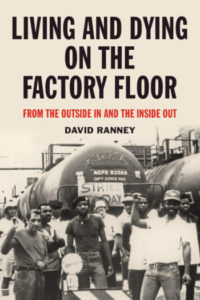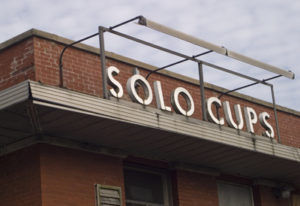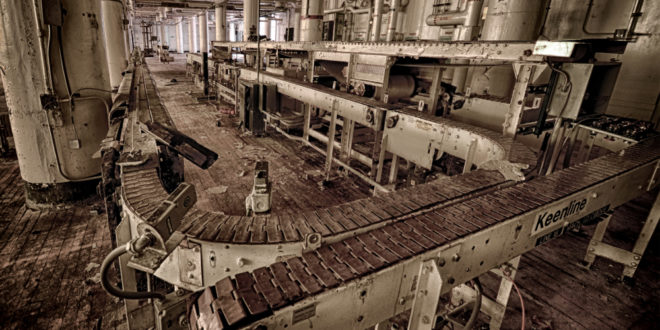Podcast: Play in new window | Download (Duration: 59:00 — 45.2MB)
 Taking a close, insider’s, look at Chicago’s industrial Southeast Side in the 1970’s and early 1980’s offers us lessons of a period brought forward to our current moment, when talking heads and politicians spout off about middle class values and middle class jobs and the way to make America great…again. What today’s show makes clear is that there’s no “middle” in America, just a great mass of exploited labor fed the dream of ease if only they’d just work a bit harder, and a bit longer.
Taking a close, insider’s, look at Chicago’s industrial Southeast Side in the 1970’s and early 1980’s offers us lessons of a period brought forward to our current moment, when talking heads and politicians spout off about middle class values and middle class jobs and the way to make America great…again. What today’s show makes clear is that there’s no “middle” in America, just a great mass of exploited labor fed the dream of ease if only they’d just work a bit harder, and a bit longer.
My guest is Dave Ranney, who from 1976 to 1982, worked at several factory jobs in Southeast Chicago and Northwest Indiana, after leaving the far less dangerous work of being an urban planning professor in Iowa. Ranney’s day-to-day life on the factory floor is punctuated by spontaneous wildcat strikes over management abuses, an immigration raid, industrial accidents, a failed effort to unionize and a murder. He details this in his new book, Living and Dying on the Factory Floor: From the Outside In and the Inside Out, newly published by PM Press.
 By sharing his life working in the “lower end” of the so-called Middle Class Dave Ranney wants readers to question what it is we want to bring back in order to make these working lives great? Ranney notes he got paid better for these difficult and dangerous jobs than workers do today, making the 2018 equivalent of about $23.00 an hour in the period he was a welder at Solo Cup. The average hourly wage for a welder today, nearly 40 years later, is $19.00. Wages are down and the cost of living is way up…what institutions in the US have the workers’ backs?
By sharing his life working in the “lower end” of the so-called Middle Class Dave Ranney wants readers to question what it is we want to bring back in order to make these working lives great? Ranney notes he got paid better for these difficult and dangerous jobs than workers do today, making the 2018 equivalent of about $23.00 an hour in the period he was a welder at Solo Cup. The average hourly wage for a welder today, nearly 40 years later, is $19.00. Wages are down and the cost of living is way up…what institutions in the US have the workers’ backs?
These “middle class jobs” pitted black and brown labor against white labor, white management, and white owners, in factories that served as sites of immigration policy for social control, endangered worker safety and health, practiced environmental pollution as a matter of course, and hindered our ability to create a just society.
And what about labor unions? In Living and Dying on the Factory Floor, they’re either “mobbed up” or legally required, and satisfied, to side with the bosses…just another way to keeping the working stiffs at the grind.
We’ll open with “At McKie’s” by Sonny Rollins and Coleman Hawkins off of the 1963 album Sonny Meets Hawk! McKie’s was a famous jazz club at 63rd and Cottage in Woodlawn in Chicago. We’re headed a bit further south and a little east from McKie’s for today’s Interchange.
 GUEST
GUEST
David Ranney is Professor Emeritus in the College of Urban Planning and Public Affairs at the University of Illinois Chicago. He’s also the author of Global Decisions, Local Collisions: Urban Life in the New World Order and New World Disorder: The Decline of U.S. Power.
RELATED
Teaching a Man to Fish in a Steel Mill in Gary, Indiana (On Noel Ignatiev’s Acceptable Men)
There ain’t no justice, just us (Book Excerpt, Living and Dying on the Factory Floor)
“We’re Gonna Shut This Place Down,” an Interview with David Ranney (Jacobin)
Black Worker White Worker, Noel Ignatiev (Sojourner Truth Organization, 1972)
MUSIC
“At McKie’s” Sonny Rollins and Coleman Hawkins
“Gates of Steel” Devo
“Red Solo Cup” Toby Keith
“The Chemical Worker’s Song” Great Big Sea
“Pollution” Bo Diddley
CREDITS
Producer & Host: Doug Storm
Executive Producer: Wes Martin
Main Photo: The Idiot Photographer
 WFHB Bloomington Community Radio
WFHB Bloomington Community Radio


